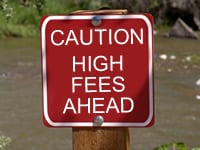 Banks make their money from the fees they charge you the customer Your goal is to not pay these fees, so that you keep more money in your account For 2010, I want you to avoid the following bank fees:
Banks make their money from the fees they charge you the customer Your goal is to not pay these fees, so that you keep more money in your account For 2010, I want you to avoid the following bank fees:
Checking account fees These fees can be avoided all together so check with your bank Typically banks will waive their fees if you have a savings account with the bank and they can link the two accounts together Some will ask you to have a deposit direct deposited to your checking account to avoid the fees Ask your banker and then do what they say to avoid this fee.
Uncollected Funds When you deposit a check, the check has to become available (the funds go from one bank account to yours), before you can use that money Uncollected funds occur when you attempt to use this money before it is available This will cause an uncollected funds fee to your account You need to check with the bank or to check online to see what your available funds balance is before using your money.
Non-Sufficient Funds This is when you write a check, withdraw money from the ATM or make a purchase with your debit card for more money than you have in your account If this happens the bank will charge you a fee for this transaction (you could incur this fee for each transaction that goes through your account) You need to know how much is in your bank account to avoid this fee.
All these fees are money makers for the bank and it’s to your best interest to avoid them and keep your money for you Keep good accurate records and you can eliminatethem.


